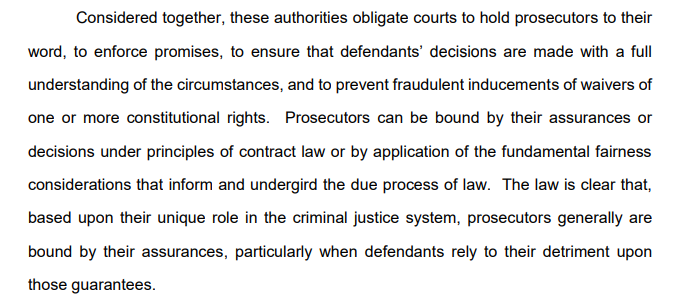
Pennsylvania Supreme Court overturns Cosby's conviction.
Explains that because one DA compelled Cosby to testify in a civil action without the benefit of the 5A privilege against self-incrimination, successor DAs could not use that inculpatory testimony in his criminal trial.
Explains that because one DA compelled Cosby to testify in a civil action without the benefit of the 5A privilege against self-incrimination, successor DAs could not use that inculpatory testimony in his criminal trial.
"we hold that, when a prosecutor makes an unconditional promise of non-prosecution, and when the defendant relies upon that guarantee to the detriment of his constitutional right not to testify, ..."
pacourts.us/assets/opinion…
pacourts.us/assets/opinion…

"... the principle of fundamental fairness that undergirds due process of law in our criminal justice system demands that the promise be enforced."
Some very strong language in here about due process.
"Interactions between a prosecutor and a criminal defendant . . . are not immune from the dictates of due process and fundamental fairness."
"Interactions between a prosecutor and a criminal defendant . . . are not immune from the dictates of due process and fundamental fairness."

This outcome was self-inflicted. Yes, Cosby was a predator. But prosecutors can't compel him to waive his 5A rights and then say "ha ha, got you now."
There's a lot in here worth thinking about. (Lawgeeks, get on it.)
The maj. op. notes that the dissent and the commonwealth get it backwards on whether Cosby should have relied on DA Castor's assurances.
The maj. op. notes that the dissent and the commonwealth get it backwards on whether Cosby should have relied on DA Castor's assurances.

• • •
Missing some Tweet in this thread? You can try to
force a refresh








